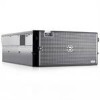Dell PowerEdge 2900 Hardware Owner's Manual (PDF) - Page 79
Cooling Shroud, Removing the Cooling Shroud
 |
View all Dell PowerEdge 2900 manuals
Add to My Manuals
Save this manual to your list of manuals |
Page 79 highlights
Cooling Shroud The cooling shroud produces and directs airflow over the system memory modules with an attached hotplug fan. The fan need not be removed prior to removing the shroud. Removing the Cooling Shroud CAUTION: Only trained service technicians are authorized to remove the system cover and access any of the components inside the system. See your Product Information Guide for complete information about safety precautions, working inside the computer, and protecting against electrostatic discharge. 1 Turn off the system, including any attached peripherals, and disconnect the system from the electrical outlet. NOTICE: Never remove the memory cooling shroud without first powering down the system. Overheating of the system can develop quickly resulting in a shutdown of the system and the loss of data. 2 Open the system. See "Opening the System" on page 53. 3 To remove the cooling shroud, release the blue latches on the shroud by pulling each latch outward from its securing tab. See Figure 3-20. 4 Lift the shroud straight up to disengage the fan connector from the system board, and then lift the shroud out of the system. See Figure 3-20. CAUTION: The DIMMs are hot to the touch for some time after the system has been powered down. Allow time for the DIMMs to cool before handling them. Handle the DIMMs by the card edges and avoid touching the DIMM components. Installing System Components 79















